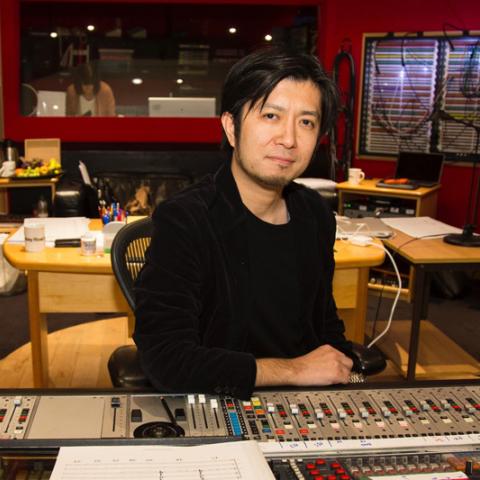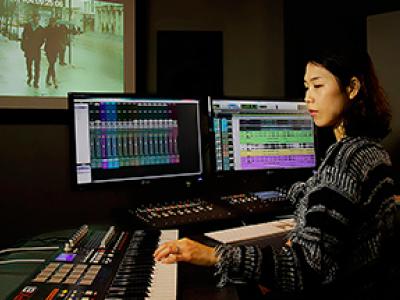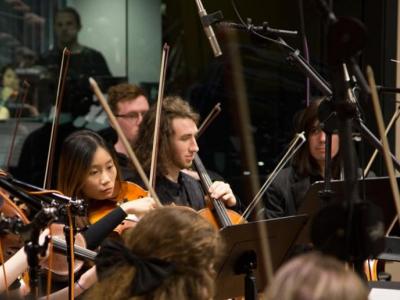What does a Composer (Video Games) do?
As video games have grown more complex and immersive, so too have the soundtracks that accompany them. Today, contemporary video game scores can be every bit as dynamic and sophisticated as movie soundtracks—likely because video game composers frequently work on films and television shows and vice versa. Just like film scores, video game scores require dozens of individual pieces of music—called "cues"—that collectively serve to create a mood, enhance the action and drama playing out on screen, and cultivate a sense of time and place. However, that's where the similarities end; while films and television shows are passive viewing experiences, video games are interactive journeys that require composers to embrace variables unique to game design.
To get a foot in the door, aspiring composers will need a show reel to send to prospective employers, which means recording a short collection of cues on their own time.
Unlike movie scores, video game scores must respond seamlessly to different modes of gameplay (e.g., exploration, combat, or problem solving) and react instantly to a player's on-screen maneuvers—swelling in victory the moment a battle is won, for example, or quieting ominously as the player enters stealth mode. Writing music for an interactive framework requires that composers master the creation of rich linear loops, music chunks suitable for resequencing, individual themes for characters, and compositional fragments for use within a generative system (such as in the life-simulation game Spore). Composers who write for top-tier games—referred to as triple-A—may record their scores with full orchestras, while independent developers and smaller titles are likely to use a combination of recorded instruments and samples.
At a Glance
Besides being excellent composers with advanced training in musical composition, video game composers must have some experience playing or making games to understand the way in which their music will be used. Video game composers who are early in their careers likely need an additional source of income; this could mean working for video game developers in other capacities (e.g., as a sound designer or audio developer), working as a freelance composer, or even becoming the assistant to an established composer. One could also freelance as an orchestrator, copyist, session conductor, or session musician.
After composing for or contributing music to a number of shipped games, talented and lucky video game composers might begin to receive recognition and enough compensation to drop the side gigs. Skilled video game composers, especially those who demonstrate great flexibility in their compositions, are a hot commodity in the industry. The reward for their hard work is a steady flow of projects from top-tier studios, enabling them to support themselves by doing what they love most—writing music for video games—while contributing to exciting, genre-defining projects.
A rapidly growing industry, video gaming is overflowing with opportunity and competition. To get a foot in the door, aspiring composers will need a show reel to send to prospective employers, which means recording a short collection of cues on their own time. Even more valuable, however, is a complete game with a corresponding soundtrack. A show reel can demonstrate one's ability to write engaging compositions, but when it comes to showing off one's ability to create a mood and enhance a story or setting, a game or game demo cannot be beat.
Aspiring video game composers can kick-start their careers even as undergraduates by getting in touch with game design students or independent studios and contributing to a game soundtrack. They should also keep in mind the myriad cutting-edge opportunities available in mobile gaming, as well as with virtual and augmented reality companies like Magic Leap, Oculus, and Exit Reality.
- Orchestration and arranging
- Composing character themes
- Composing loops
- Home studio setup
- DAWs
- Synthesizers and samplers
- Audio editing
- Video game design
- Compositional flexibility
While any skilled composer can write effective music for a video game, to make a career out of it requires a deep passion for video games and the distinctive culture, community, and history surrounding the medium. Aspiring composers should have a burning desire to contribute their own ideas to the larger musical conversation. They should also be able to work well within a creative team; while composing is a solitary art, it is also—paradoxically—an intensely collaborative one. Finally, because video game composers are generally freelancers, they need tenacity, salesmanship, and networking ability to thrive in this fast-growing and competitive field.
Most video game composers are independent contractors who work from home studios, either alone or—if well-established and working on a higher budget—alongside a team of assistants. Composers may come into video game studio offices for meetings of the creative team, but for the most part, the work is performed remotely. In-house positions in this industry are rare, but composers who make strong professional connections with a particular studio or team, or who work on the soundtrack for a multi-title franchise, may find themselves working consistently with the same studio.












